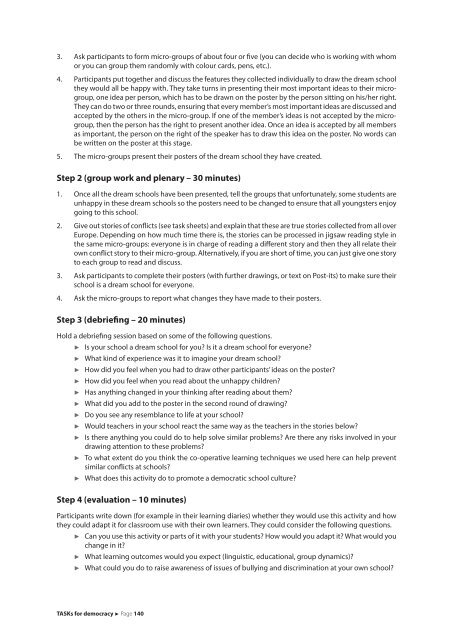TASKs for democracy
4NYw4W
4NYw4W
You also want an ePaper? Increase the reach of your titles
YUMPU automatically turns print PDFs into web optimized ePapers that Google loves.
3. Ask participants to <strong>for</strong>m micro-groups of about four or five (you can decide who is working with whom<br />
or you can group them randomly with colour cards, pens, etc.).<br />
4. Participants put together and discuss the features they collected individually to draw the dream school<br />
they would all be happy with. They take turns in presenting their most important ideas to their microgroup,<br />
one idea per person, which has to be drawn on the poster by the person sitting on his/her right.<br />
They can do two or three rounds, ensuring that every member’s most important ideas are discussed and<br />
accepted by the others in the micro-group. If one of the member’s ideas is not accepted by the microgroup,<br />
then the person has the right to present another idea. Once an idea is accepted by all members<br />
as important, the person on the right of the speaker has to draw this idea on the poster. No words can<br />
be written on the poster at this stage.<br />
5. The micro-groups present their posters of the dream school they have created.<br />
Step 2 (group work and plenary – 30 minutes)<br />
1. Once all the dream schools have been presented, tell the groups that un<strong>for</strong>tunately, some students are<br />
unhappy in these dream schools so the posters need to be changed to ensure that all youngsters enjoy<br />
going to this school.<br />
2. Give out stories of conflicts (see task sheets) and explain that these are true stories collected from all over<br />
Europe. Depending on how much time there is, the stories can be processed in jigsaw reading style in<br />
the same micro-groups: everyone is in charge of reading a different story and then they all relate their<br />
own conflict story to their micro-group. Alternatively, if you are short of time, you can just give one story<br />
to each group to read and discuss.<br />
3. Ask participants to complete their posters (with further drawings, or text on Post-its) to make sure their<br />
school is a dream school <strong>for</strong> everyone.<br />
4. Ask the micro-groups to report what changes they have made to their posters.<br />
Step 3 (debriefing – 20 minutes)<br />
Hold a debriefing session based on some of the following questions.<br />
<br />
<br />
<br />
<br />
<br />
<br />
<br />
<br />
<br />
<br />
<br />
Is your school a dream school <strong>for</strong> you? Is it a dream school <strong>for</strong> everyone?<br />
What kind of experience was it to imagine your dream school?<br />
How did you feel when you had to draw other participants’ ideas on the poster?<br />
How did you feel when you read about the unhappy children?<br />
Has anything changed in your thinking after reading about them?<br />
What did you add to the poster in the second round of drawing?<br />
Do you see any resemblance to life at your school?<br />
Would teachers in your school react the same way as the teachers in the stories below?<br />
Is there anything you could do to help solve similar problems? Are there any risks involved in your<br />
drawing attention to these problems?<br />
To what extent do you think the co-operative learning techniques we used here can help prevent<br />
similar conflicts at schools?<br />
What does this activity do to promote a democratic school culture?<br />
Step 4 (evaluation – 10 minutes)<br />
Participants write down (<strong>for</strong> example in their learning diaries) whether they would use this activity and how<br />
they could adapt it <strong>for</strong> classroom use with their own learners. They could consider the following questions.<br />
<br />
<br />
Can you use this activity or parts of it with your students? How would you adapt it? What would you<br />
change in it?<br />
What learning outcomes would you expect (linguistic, educational, group dynamics)?<br />
What could you do to raise awareness of issues of bullying and discrimination at your own school?<br />
<strong>TASKs</strong> <strong>for</strong> <strong>democracy</strong> Page 140


